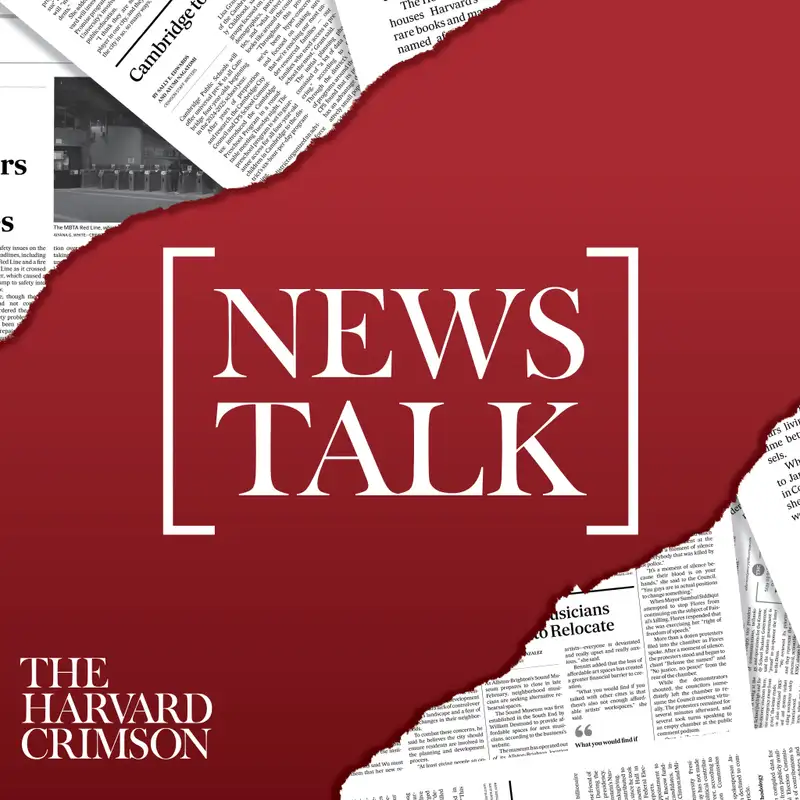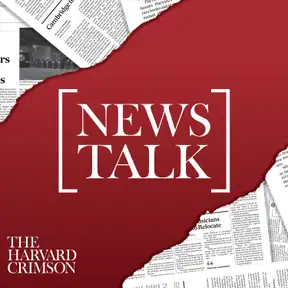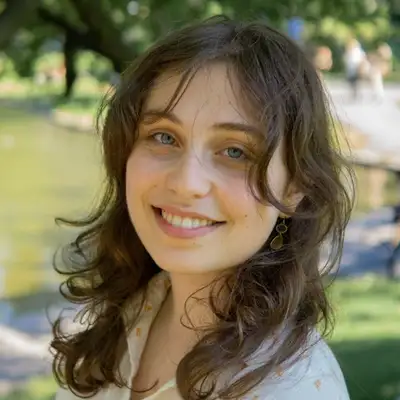
Meet John Manning, Harvard’s New Conservative Interim Provost
From 14 Plympton Street, this is Newstalk. I'm Yael Goldstein. On March 1st, Interim President Alan Garber announced that Harvard Law School Dean John Manning will serve as the school's second-most powerful administrator: the University provost. Unlike most other top administrators, however, Manning has declined to schedule regular interviews with The Crimson and has proved to be one of Harvard's most media-shy deans. This leads us to an essential question: who is John Manning? Two reporters join us to discuss.
S. Mac Healey:My name is S. Mac Healey.
Saketh Sundar:And my name is Saketh Sundar, and we're both junior beat reporters covering Harvard Law School for the Harvard Crimson.
Yael S. Goldstein:Thank you so much, Saketh and Mac, for joining us on Newstalk today. So we're here to talk about the recent appointment of interim provost John Manning. Let's start off with the significance of being Harvard's provost. Why is this a big deal in the first place?
Saketh Sundar:Yeah. So the provost in general is, like, the 2nd in line to the President, and as Harvard's Chief Academic Officer, they work a lot with faculty on instituting university-wide research policies or academic policies.
S. Mac Healey:And the provost is a particularly important position at this moment in which we're experiencing a university-wide leadership crisis. More media attention and attention from faculty members is being applied to our university leadership. And we see that the provost acts as a close intermediary between faculty and the university president, especially when someone like Alan Garber moves from being a long-term provost into being the interim University President. And so just like the leadership crisis has impacted the presidency, we see that it's moving down into other university roles like provost.
Yael S. Goldstein:So John Manning is slated to be Harvard's new interim provost. What do we know about him?
S. Mac Healey:John Manning has been dean of Harvard Law School since 2017, and he has a long track record of academic success as well as administrative experience. He served as a deputy dean at the Law School before becoming dean, and we see that his popularity amongst faculty, amongst students, and his administrative success has brought him up as a potential university-wide leader in the past. He was amongst the finalists for the presidency during the university's last presidential search when former President Claudine Gay was selected as 30th president. And so, Manning is certainly not a new figure to university-wide leadership positions or the searches for those positions, and he was seen as a likely and strong choice for the position. Something else that we know about John Manning is that he has called himself a conservative, which is an anomaly amongst Harvard graduates. He graduated from Harvard College himself, as well as the Law School, but it is also an anomaly amongst Harvard's faculty, which The Crimson has done extensive reporting on their broadly liberal leanings. So John Manning has distinguished himself in that respect.
Saketh Sundar:But there's a sort of nuance to his conservatism in the sense that he is not someone who you might say is a very political person. According to Harvard Law School professors, he distanced himself from the Republican party after Donald Trump's nomination in 2016.
Yael S. Goldstein:So you mentioned Manning was previously a candidate in the presidential search that ultimately elected Claudine Gay. Does his appointment as interim provost have any bearing on the current search for Harvard's next president?
Saketh Sundar:The role of provost is very important, and the Crimson had previously reported that Alan Garber indicated that he would leave the university administration entirely if he was not named the next president. So the fact that Alan Garber went from provost to president indicates that the provost is a prominent role for people who want presidential prospects, but I don't think we can make any further comment than that.
S. Mac Healey:And as far as we know, a presidential search led by Harvard's Corporation has not officially begun. And so we could expect that this process will take much longer than the previous search which had selected our last president. As a result, university-wide leadership positions like provost need to be filled while the university moves ahead and continues its operations while future presidents are selected. And so Manning's selection makes sense for a university trying to solidify its leadership during a leadership crisis. And also, it makes sense for the university to pick someone like Manning who's only been described as a strong Harvard citizen and someone dedicated to the University.
Yael S. Goldstein:So I'm wondering what we can expect from interim provost Manning based on his previous post as Harvard Law School Dean?
Saketh Sundar:Yeah. So Manning is a big proponent of institutional neutrality, but he's also someone who's very open to promoting these open discourse on campus. At Harvard Law School, he had several initiatives to promote civil discourse on very tense issues. He instituted a new forum called the Rappaport Forum where people debated different topics that were controversial at the time. And he also instituted these rules at Harvard Law School School called Chatham House Rules where whatever students say in class can't be attributed to them outside the classroom. So that way, students can freely speak their mind without fear of harassment. He's actually faced criticism on this in the past of how he refuses to take a strong stance on anything, which is actually something that Garber highlighted in his email to Harvard community that Manning is, he said, an ideal individual to lead Harvard's new initiatives on institutional neutrality, which is backed up by his past of promoting open discourse and not taking stances himself.
S. Mac Healey:Manning's new position as interim provost accomplishes something in and of itself. It provides somewhat of an institutional defense for Harvard to be promoting one of its most prominent conservative faculty members at a time in which Harvard as an institution is facing broad criticism for promoting progressive ideals. Manning's recent promotion seems to be either in response to that or in defense [against] those criticisms. Also, Manning's new position as provost would lend itself towards more institutional action on the kind of issues that we're facing today. Saketh had mentioned the institutional neutrality in which he had already de facto [put] in place at Harvard Law School, not commenting on Brett Kavanaugh's Supreme Court nomination when Brett Kavanaugh had been a lecturer at Harvard Law School or responding to criticisms of religious freedom clinics that the Law School was implementing.
S. Mac Healey:And so by removing himself from hot-button topical political issues, Manning has established himself with a persona of someone who is inherently non-political, while also bringing himself into a leadership role in which the University tries to draw back some of its more political actions.
Yael S. Goldstein:So you both mentioned how Manning has received some praise for his politically neutral stance. Are there any groups or individuals on campus who have voiced concerns about his recent appointment?
S. Mac Healey:We've heard some concerns from faculty members across the University. They aren't necessarily concerns over his conservatism. Many have agreed that this is an asset for him at the time. There are some concerns that, by appointing a conservative to such a prominent University position while the University is under attack by conservatives, [it] seems to be a means for Garber to give in to those same critics. Those are critics who these faculty members don't believe we shouldn't be giving an inch of room to, and so that is one criticism for his hiring [itself] rather than on Manning as an individual.
S. Mac Healey:One other criticism that we've heard is that the main leadership positions at Harvard are now all occupied by men. And so gender diversity or racial diversity amongst Harvard's top leadership is sorely lacking. And so this is either a question that will be left unanswered if University leadership remains as it is for the foreseeable future, or it will be a question that the Corporation tries to answer when selecting its next president once it begins its new presidential search.
Saketh Sundar:So I think what Mac spoke to as for the diversity, some have voiced concerns that when Claudine Gay was removed, a lot of the discourse around Claudine Gay's removal was sort of racialized. And filling in two top administrative roles with two white men, it definitely sends out a signal from the University. People have mixed reaction to that, and I think that is something that has yet to be fully discussed among the general community.
Yael S. Goldstein:So overall, given Manning's appointment as interim provost, where does that leave the Harvard administration now?
S. Mac Healey:I think HLS professor Janet Halley put it well when she said that the Law School's loss is the University's gain. We know that John Manning is universally respected at the Law School. He's known as a strong administrator and a strong internal choice for this position. Former University President Larry Bacow called him one of the strongest deans he's ever worked with. We think the University is trying to solidify itself as it goes into the next presidential search and selects its next provost.
S. Mac Healey:Both Interim President Garber and Interim Provost Manning are interim leaders. And as a result, we can expect either of them to stay in their positions, [or] neither of them to stay in their positions. And so it is not certain where the University's leadership is going in the meantime.
Yael S. Goldstein:Alright. Thank you so much for joining me, Mac and Saketh, to discuss the appointment of Interim Provost John Manning.
S. Mac Healey:Thank you. Thank you.
Yael S. Goldstein:This episode of Newstalk was hosted by Yael s Goldstein. Producers of this episode are Yael S. Goldstein and Frank S. Zhou. Our Multimedia Chairs are Julian J. Giordano and Addison Y. Liu. Our Associate Managing Editors are Claire Yuan and Elias J. Schisgall. Our Managing Editor is Miles J. Herzenhorn.
Yael S. Goldstein:Our president is J. Sellers Hill. Music in this episode comes from freesound.org. From Plympton Street, this is Newstalk.



